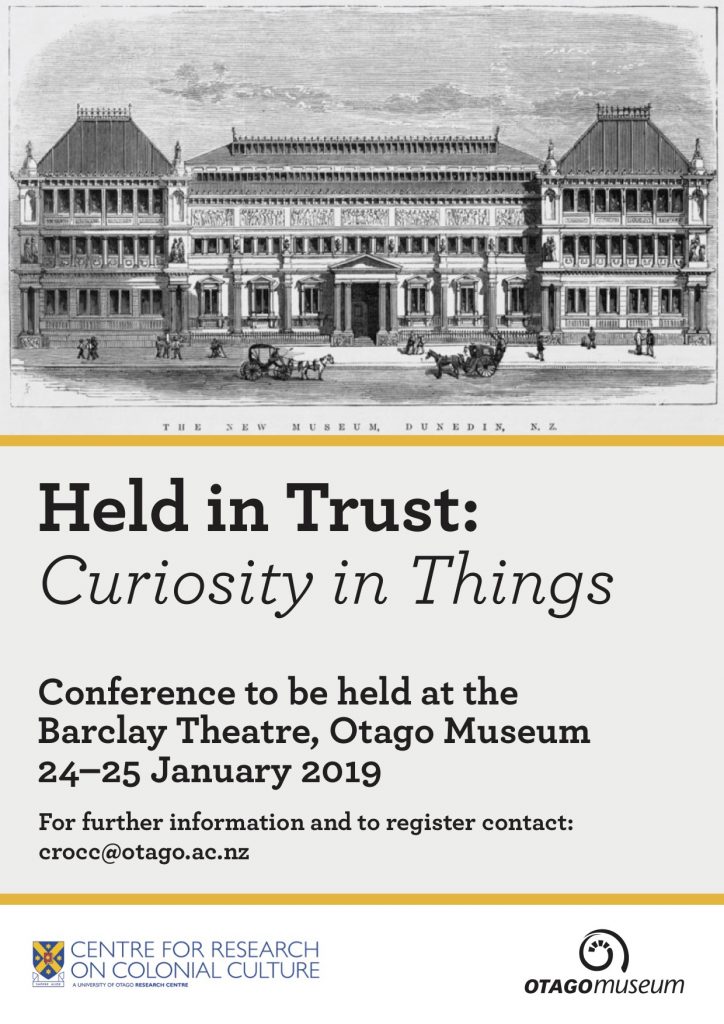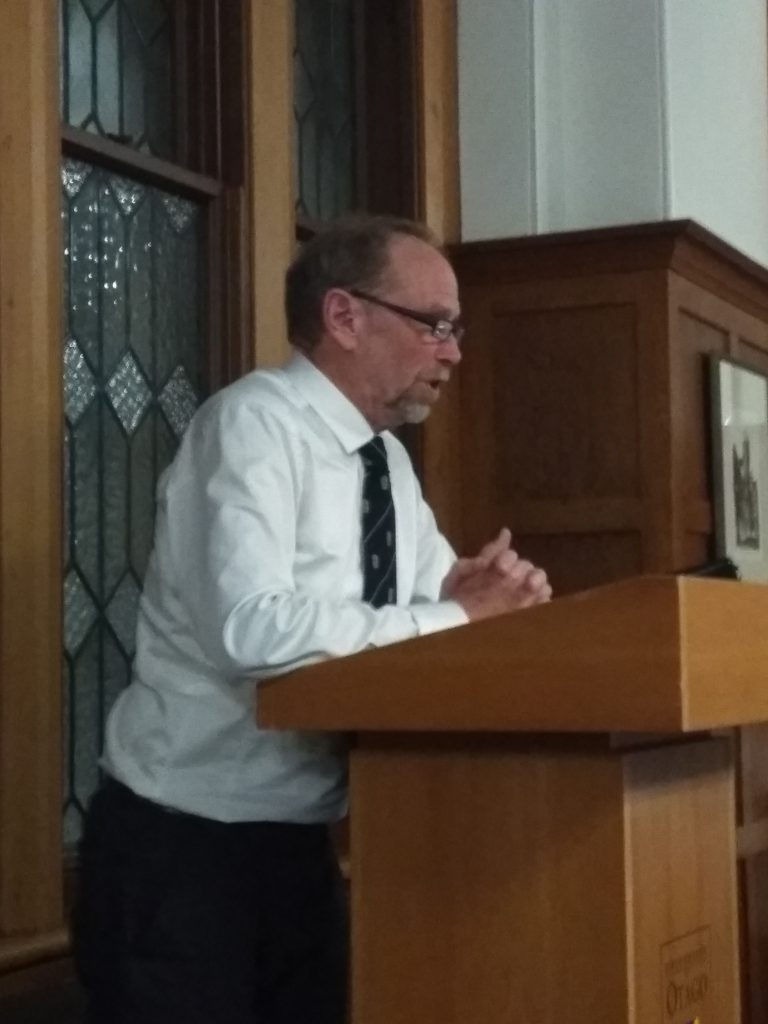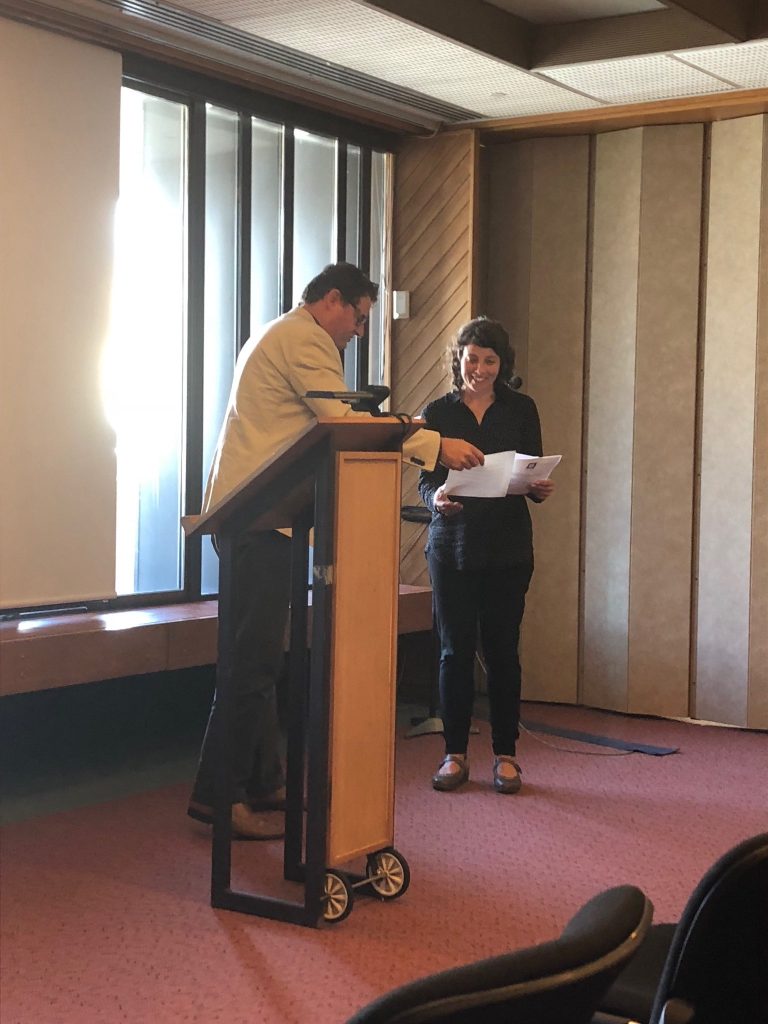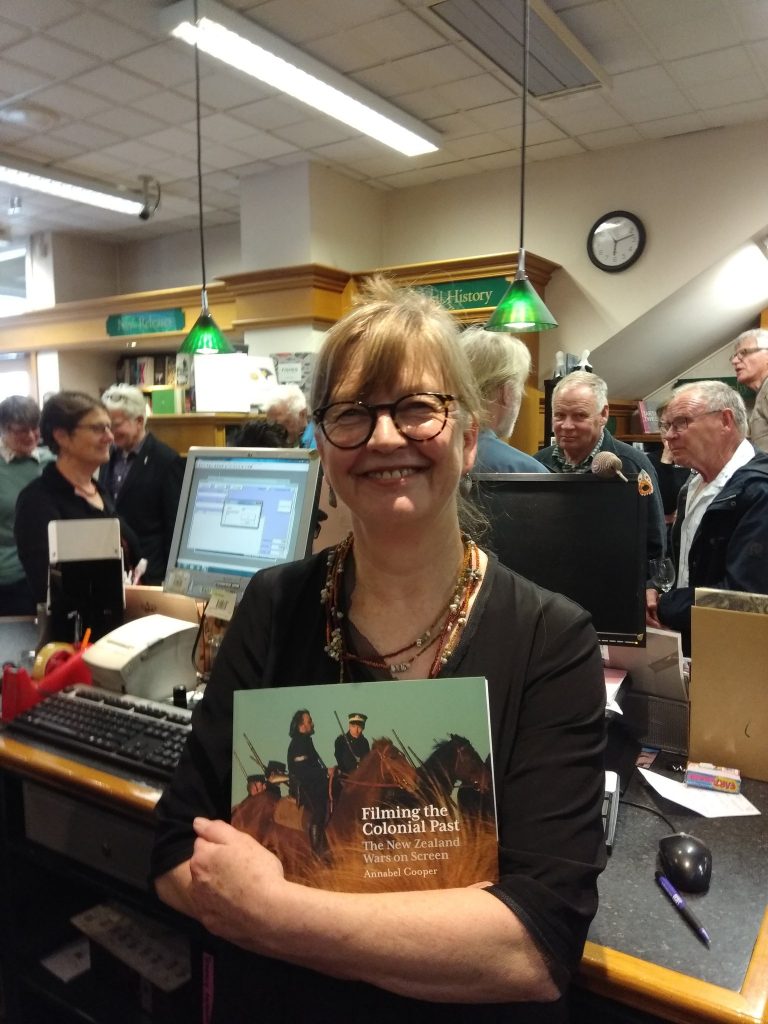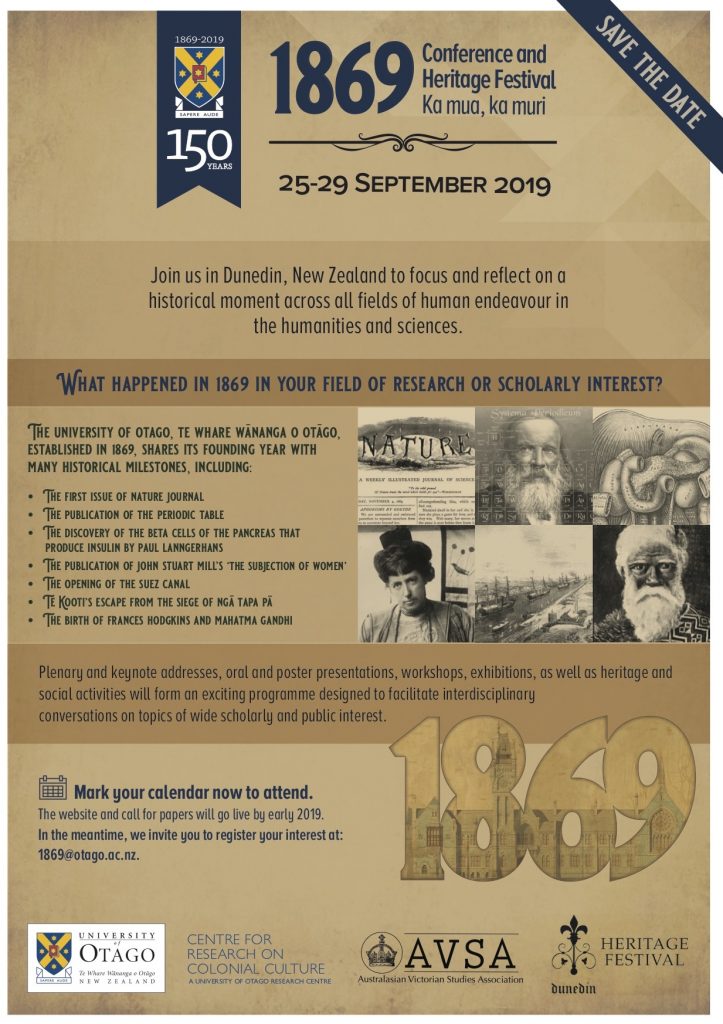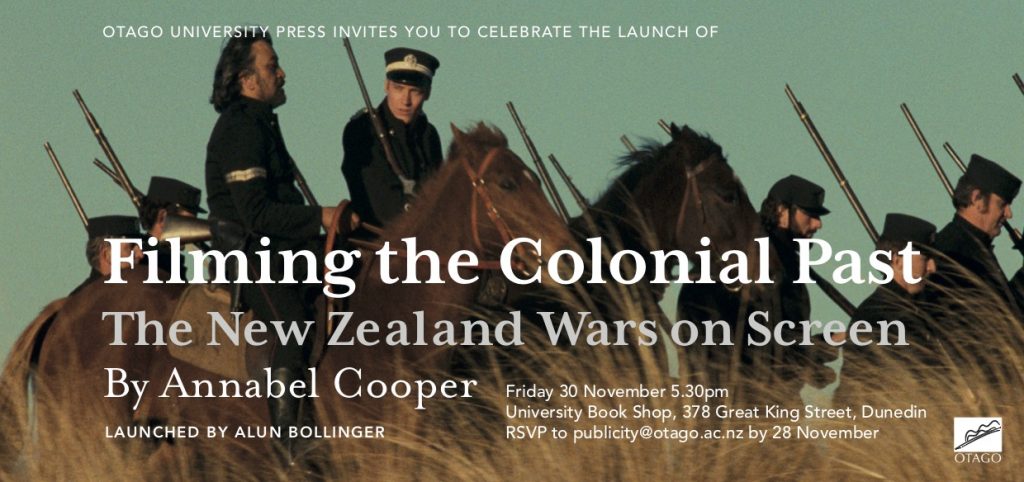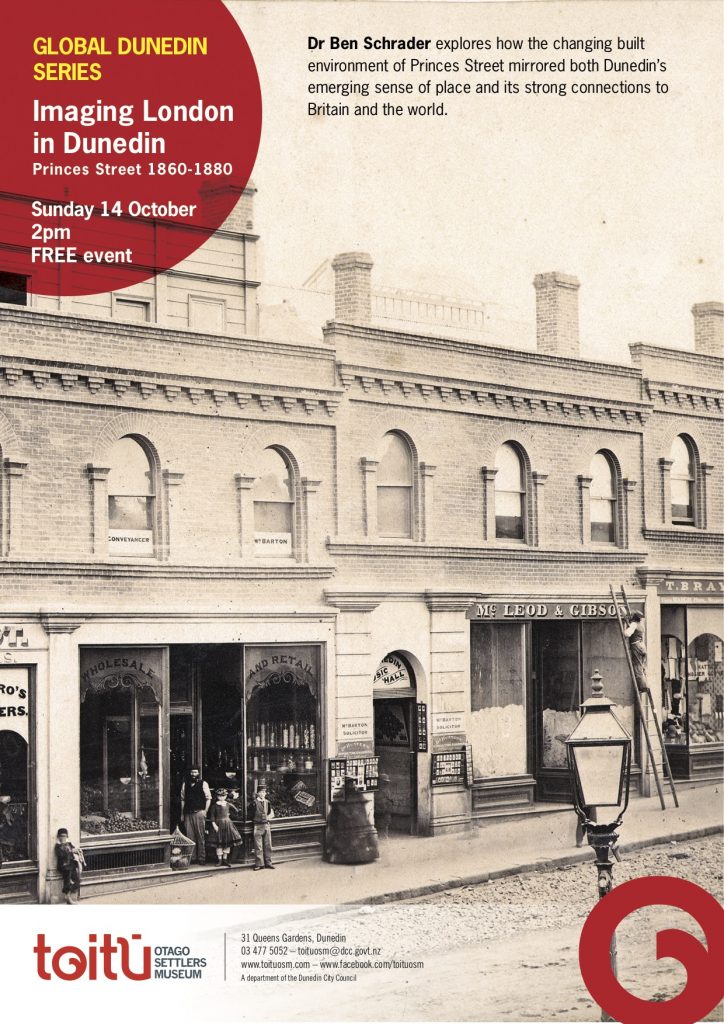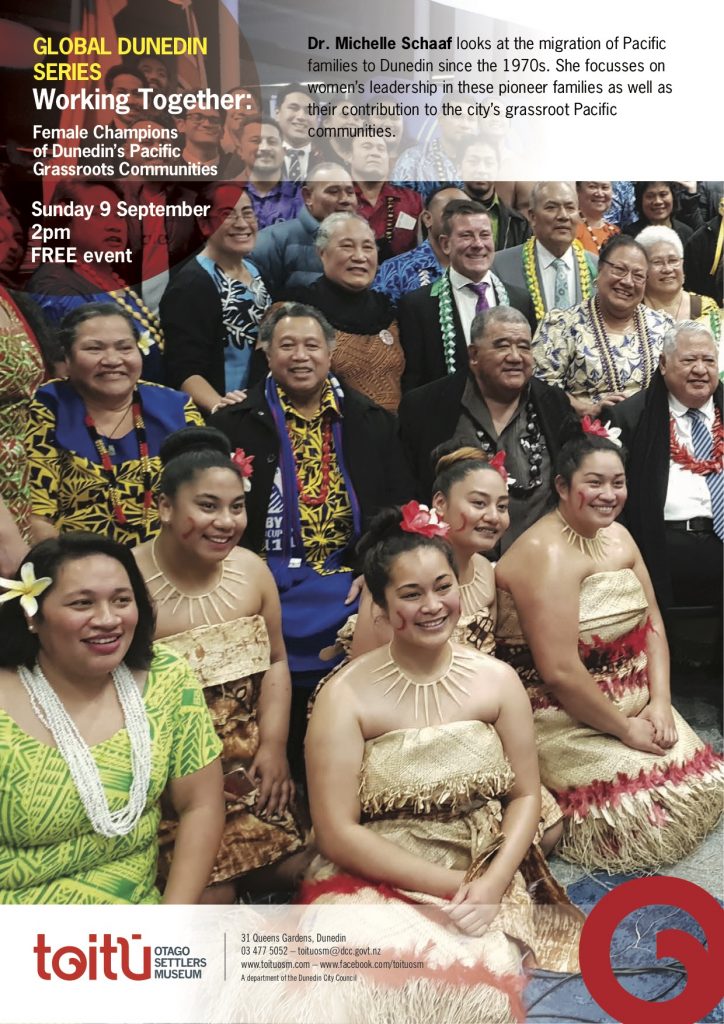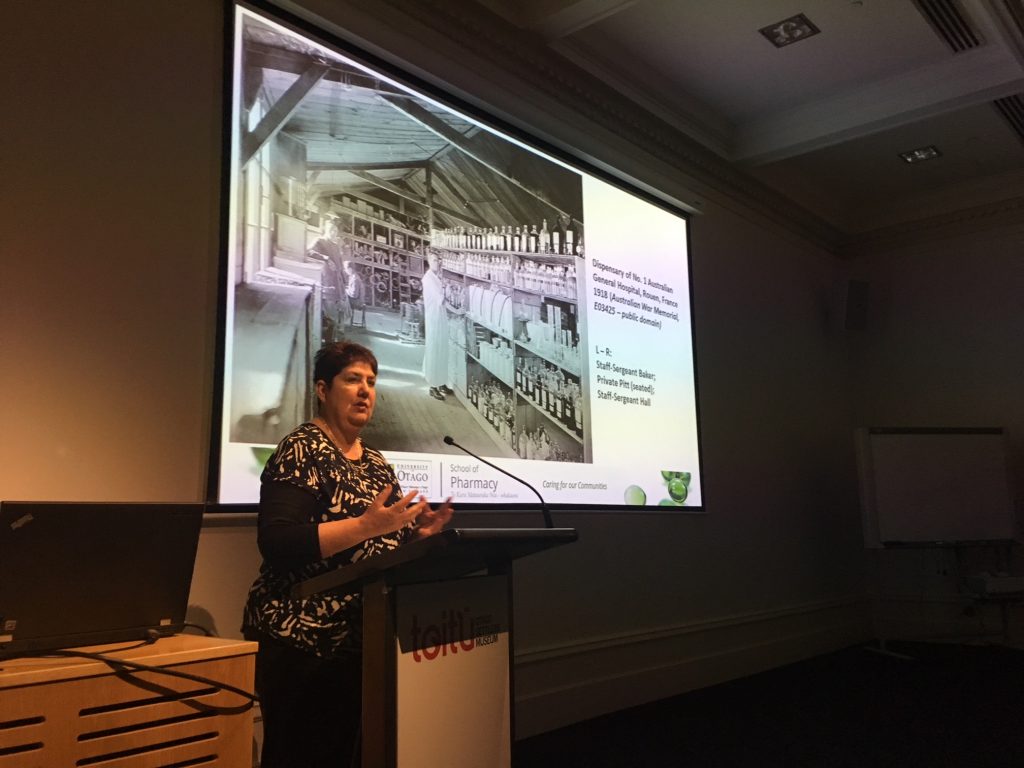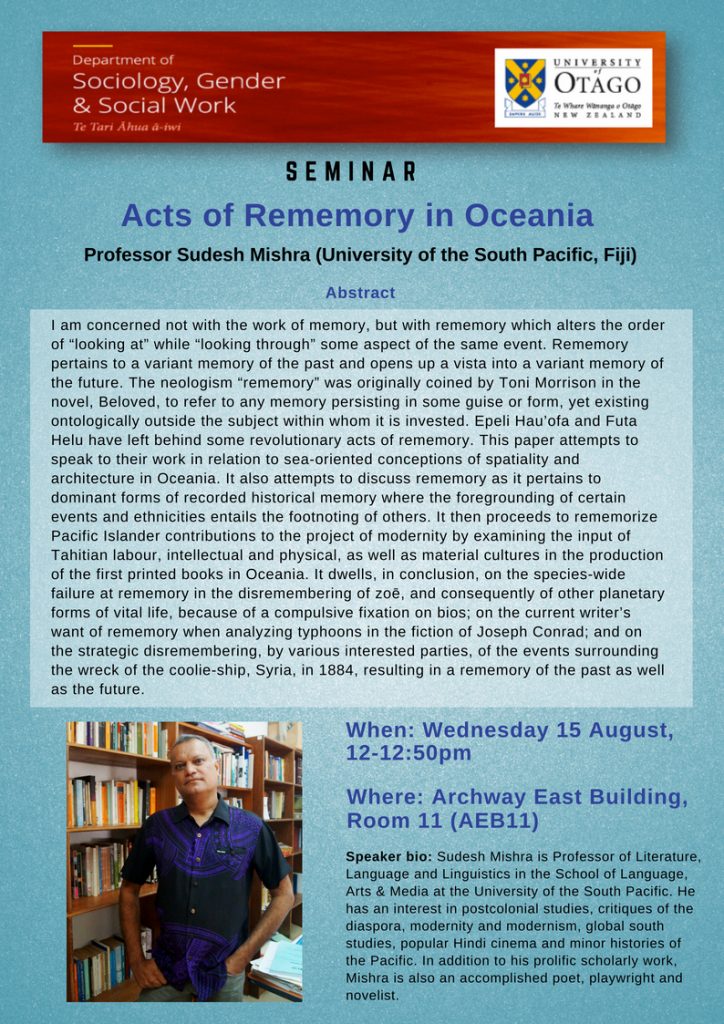Held in Trust: Curiosity in Things Conference
Just a reminder to register for the Held in Trust: Curiosity in Things Conference to be held at Otago Museum on 24-25 January 2019. This is a FREE event, so please do register your interest in attending by contacting us at crocc@otago.ac.nz
Centre News
Over the past few months the Centre has been busy with symposia and planning our 2019 schedule. What follows are some recent highlights in Centre activities.
Throughout the year we have sponsored a number of events, notably the Global Dunedin Speaker Series at Toitū organised by Angela Wanhalla, which was brought to a close on 14 October with a lecture from Dr. Ben Schrader who spoke to a large and lively audience about the links between place, space, urban culture and colonial history. The Centre thanks all the presenters who contributed to the series: Tony Ballantyne, Charlotte Macdonald, Michelle Schaaf, Kate Bagnall, Rosi Crane, Lea Doughty, and Jill Haley.
The Centre closed 2018 with two symposia. On 1-2 November, Lachy Paterson, Megan Pōtiki and Paerau Warbrick co-organised and hosted a symposium on Māori texts at the Hocken Collections. He Tuhinga nō Neherā: Texts, Contexts and Resonances featured scholars who spoke about and/or performed a range of texts. Michael Reilly discussed orality and voice in Kāi Tahu traditions collected by the German missionary Johannes Wohlers; Lachy Paterson examined the writings of Wiremu Taratoa; Tahu Potiki used the writings of Matiaha Tiramorehu with relevance to occupancy of Moeraki; Paul Diamond addressed texts that no longer exist in their original form or are held overseas; and Barbara Brookes spoke about the maiden speeches of Iriaka Ratana and Whetu Tirakatene-Sullivan. Many drew upon documents in family collections, such as Megan Pōtiki who talked about the dreams her tūpuna Raniera Ellison recorded in his journal; Rangi Matamua spoke about Māori knowledge of the stars written in a private ledger; Paerau Warbrick used family letters, as did Poia Rewi; Anaru Eketone discussed a Ngāti Maniapoto petition led by his grandfather; Tangiwai Rewi examined the creation of a waiata; Tonga Karena looked at Indigenous discourses of peace traditions at Parihaka through haka; and Matiu Payne looked at an affidavit from a Ngāti Mutunga kuia as part of a discussion about whāngai rights.
We also hosted Making Rural New Zealand, a symposium that celebrated the career of Professor Tom Brooking who is retiring after 41 years at the University of Otago. Co-organised by Tony Ballantyne and Jane McCabe, the symposium featured talks by Tom’s friends, colleagues, research collaborators and former students. Keynote presentations from Graeme Wynn, Eric Pawson, Jim McAloon and Jane McCabe bookended each day, with shorter presentations from Jim Williams, Ann Pomeroy, Hugh Campbell, Peter Holland, Vaughan Woods, Paul Star, Katie Cooper, Tony Ballantyne, Jonathan West, and James Beattie. The symposium closed with a celebratory dinner in honour of Tom.
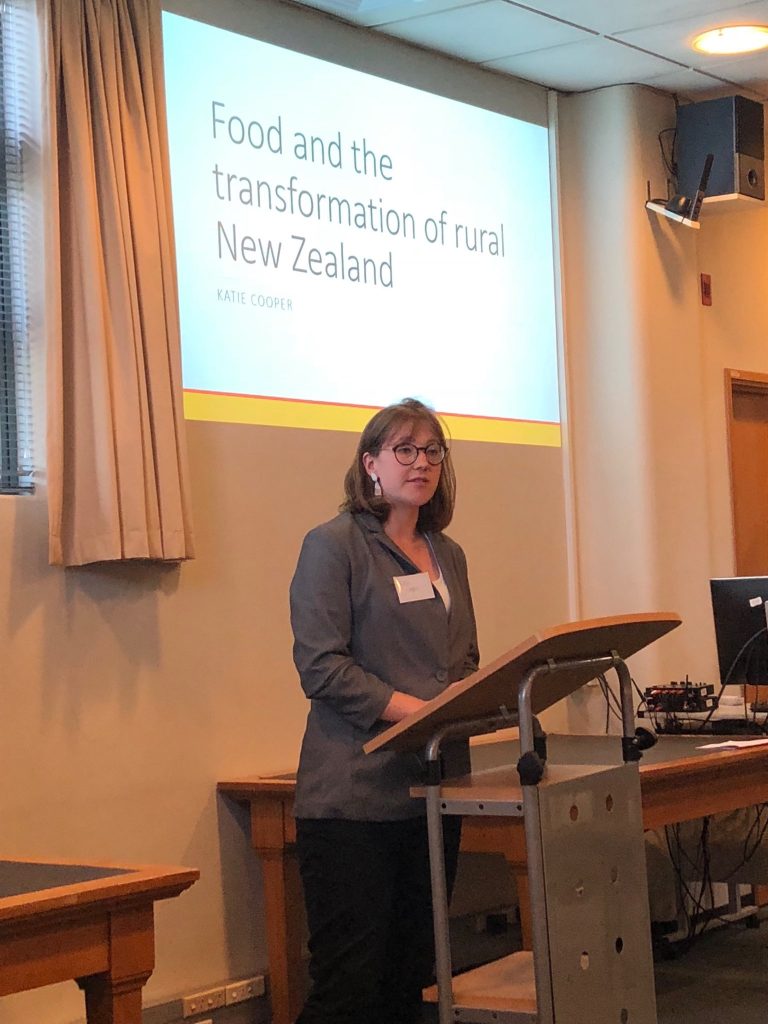
Katie Cooper (Te Papa Tongarewa) presents at the Rural New Zealand symposium in honour of Tom Brooking (photograph by @OtagoBallantyne)
In the final months of 2018 Centre members have gained a number of awards and prizes. Congratulations to Jane McCabe who was presented with the Archives and Records Association of New Zealand Ian Wards Prize for her book Race, Tea and Colonial Resettlement (Bloomsbury, 2017) at a function in Dunedin on 22 November. Jane shares the prize with Shaunnagh Dorsett.
Barbara Brookes continued to gather accolades, winning the prestigious Royal Society Te Apārangi Humanities Aronui Medal for her commitment and contribution to women’s history and New Zealand history more generally.
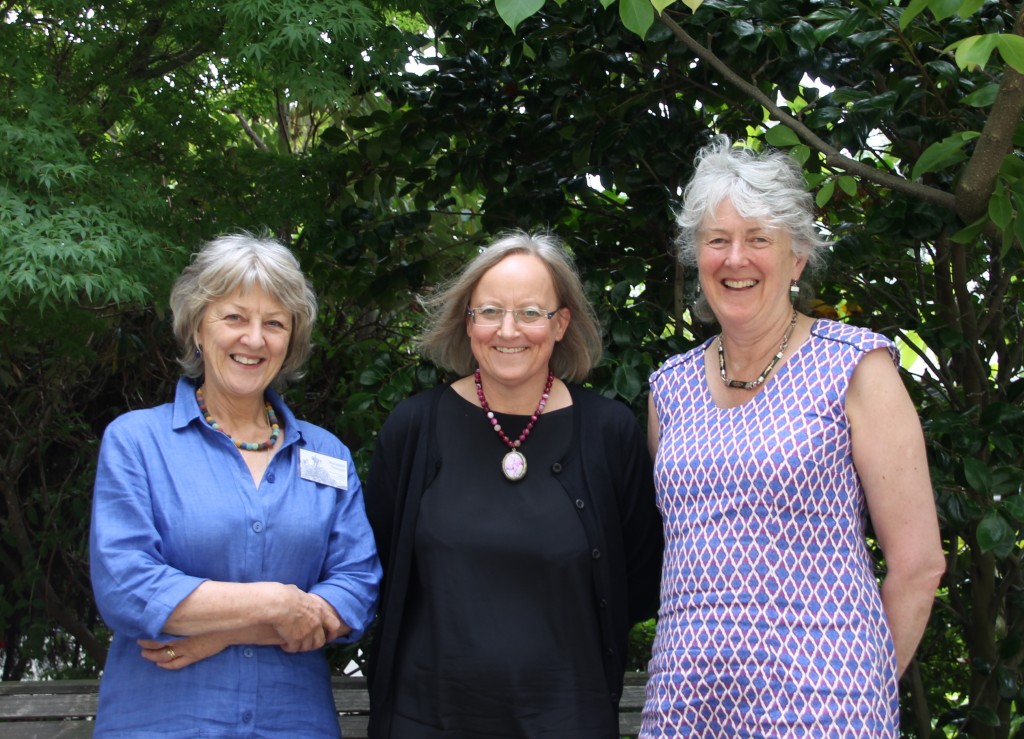
Friends and collaborators: Margaret Tennant, Charlotte MacDonald and Barbara Brookes (photograph by Lachy Paterson)
Kate Stevens and Angela Wanhalla were awarded the Journal of Pacific History’s prize for best article published in 2016-17, and in November Lachy Paterson and Angela Wanhalla were awarded a Royal Society Te Apārangi Marsden Grant (2019-2021) for a project on the histories and legacies of the Māori home front during World War II.
During 2018 a number of publications seeded at Centre events appeared: New Zealand and the Sea, edited by Frances Steel (Bridget Williams Books); Pacific Futures, co-edited by Barbara Brookes (University of Hawaii Press); and Indigenous Mobilities, edited by Rachel Standfield (ANU Press). In addition to these edited books, several special journal issues have appeared from workshops and symposia funded by the Centre. These include a special issue of History of Photography (edited by Jane Lydon and Angela Wanhalla) on Indigenous photographies; a special issue of the Journal of Pacific History on the commodity history of coconuts (edited by Judy Bennett) and an issue of Rethinking History (co-edited by James Dunk and Barbara Brookes) on archives and knowledge production.
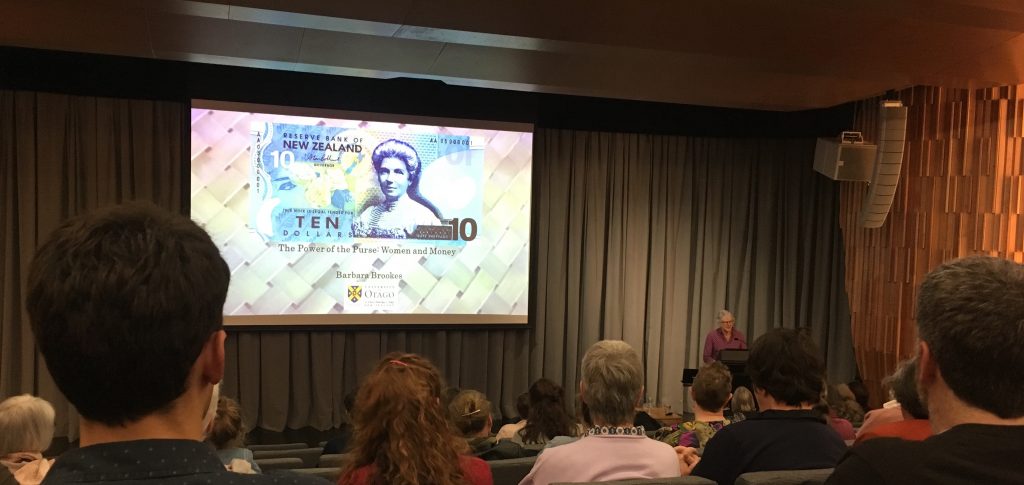
Barbara Brookes giving her keynote address at the Feminist Engagements Conference held in Wellington in September (photograph by @AWanhalla)
We closed the year with the launch of Annabel Cooper’s book, Filming the Colonial Past: New Zealand Wars on Screen.
We have a number of events planned for 2019. The first is Held in Trust: Curiosity in Things, a single-stream two-day conference at Otago Museum in late January 2019 (see poster) organised by Rosi Crane. Keynote speakers are Conal McCarthy, Tony Ballantyne and Simon Ville. Have a look at the Held In Trust Programme.
Our big event for 2019 is a conference to mark the University of Otago’s 150th anniversary in collaboration with the Australasian Victorian Studies Association (AVSA). The theme is 1869 and the CFP will be circulated in early 2019. In the meantime register your interest in attending via 1869@otago.ac.nz
Book Launch: Filming the Colonial Past
Congratulations to Annabel Cooper on the release of her book, Filming the Colonial Past: The New Zealand Wars on Screen, published by Otago University Press.
If you want to purchase a copy, please join us at UBS on Friday 30 November when Filming the Colonial Past will be officially launched by Alun Bollinger.
Keynote talk by Lachy Paterson
Centre member, Associate Professor Lachy Paterson is giving the keynote at the annual University of Otago Centre for the Book conference at 5.30-6.30pm, Thursday 1st November in the Moot Court, 10th floor of the Faculty of Law. Please feel free to come along.
The conference theme this year is Translation and Acculturation. Lachy will present “Whakamāoritanga Whakapākehātanga: Translations between Māori and English” in which he will be discussing issues pertaining to translation, both now and from New Zealand’s colonial past.
Ben Schrader to give Global Dunedin lecture
Please join us for the final talk in the Global Dunedin Lecture Series, which will be given by award-winning historian of urban culture and heritage, Dr. Ben Schrader, on Sunday 14 October. Ben will speak about the global influences on Dunedin’s 19th century architecture, focusing in particular on the built environment of Princes Street.
Ben’s talk is a free event and will be held at Toitū’s Auditorium on Sunday 14 October.
Global Dunedin Lecture on Pacific Women’s Leadership
Our next Global Dunedin lecture will be presented by Dr. Michelle Schaaf (Te Tumu: School of Māori, Pacific and Indigenous Studies) on Sunday 9 September. She will discuss the migration of Pacific families to Dunedin, focusing in particular on the role of female leadership within these pioneer families, especially their contribution to the city’s Pacific communities. Join us at 2pm on Sunday at Toitū’s Auditorium for this free event.
Public Lecture: Thinking the Empire Whole
Thinking the Empire Whole
Professor Steven Pincus
Thomas E. Donnelly Professor of British History, University of Chicago
The history of the British Empire to 1784 has been hopelessly fractured. Each bit of the Empire is discussed separately, the binary relationship between proto-nations and the imperial metropole. This was not how folks in the seventeenth and eighteenth century experienced their world. They thought and wrote about their empire as a whole. This empire was shaped by institutions and riven by debates about how best to run an empire. While some innovative scholars have recently deployed the paradigm of “settler colonialism” to attempt to reconnect and compare similar phenomena, this paradigm is insufficient because it marginalizes the imperial state, narrows the range of political economic debate, and homogenizes both the settler and indigenous experience. By thinking the empire whole it is possible to reinterpret seminal moments like the imperial crisis of the 1760s–1780s.
Location: Archway 3, 5:30pm, Wednesday 15 August, 2018
Curiosity in Things Conference
Call for Papers
HELD IN TRUST: CURIOSITY IN THINGS
A conference co-sponsored by Otago Museum and the Centre for Research on Colonial Culture, University of Otago
24-25 January 2019
Barclay Theatre, Otago Museum
The history of museums has largely been framed under the rubric of colonial domination or building cathedrals of science. But what are the bigger stories that motivated the creation of the collections?
Objects have the capacity to tell stories of lives and communities that are interconnected over space and time. Objects are the tangible material world of scientific endeavour and during the nineteenth century trade in them boomed, yet accounts of the political context surrounding their discovery and translocation are overlooked.
Looking beyond object biographies, tales of eccentric collectors, acquisition and institutional histories, this conference foregrounds the global context of commercial trade and exchange networks that contributed to the patterns of knowledge discovery and creation. What then are the bigger stories of culture, economics and politics that formed our colonial museums?
We invite contributions that address the broad theme of knowledge production in the colonial museum.
Keynote speakers:
- Professor Tony Ballantyne FRSNZ Co-director Centre for Research on Colonial Culture and Pro-Vice Chancellor Humanities, University of Otago.
- Professor Simon Ville, Senior Professor of Economic and Business History, School of Humanities and Social Inquiry in the Faculty of Law, Humanities and Arts, University of Woollongong.
- Associate Professor Conal McCarthy, Director of the Museum and Heritage Studies programme at Victoria University of Wellington.
Please send your abstract (max. 250 words) and one-page CV to crocc@otago.ac.nz by September 15th, 2018.
For further information, please contact Rosi Crane (Rosi.Crane@otagomuseum.nz).
Dunedin’s Wartime Chemists
In her Global Dunedin Lecture at Toitū on 12 August, Lea Doughty (PhD Candidate, School of Pharmacy) used a life history approach to track the wartime experiences of pharmacists who served with New Zealand forces during World War I. Lea’s research is on military medicine during the Great War, focusing on pharmacy and the ANZAC forces. Her Global Dunedin lecture touched on the reasons why pharmacy and pharmacists are often a forgotten aspect of New Zealand’s histories of World War I, largely because their work takes place at a distance from the main event, or they were diverted into other military roles. In total, 192 men who had worked as pharmacists served with New Zealand forces, 18 of whom were born in Dunedin. Of the 192 men, 27 died on active service. These included William Sloan, the first pharmacist to enlist, who died of wounds he sustained at Gallipoli, and Harold Dodds of Port Chalmers who died at Passchendaele in October 1917. Looking wider than the Dunedin cohort, Lea highlighted the range of roles pharmacists were given. William Brosnahan, from the West Coast, was utilised as a vet in the Imperial Camel Corps. Interestingly, there was one Māori chemist who served with the New Zealand forces. Jack Hiroti attained the rank of Sergeant in World War I, and went on to serve with distinction in World War II with the 28th Māori Battalion. Many thanks to Lea for providing an interesting insight into a little known aspect of New Zealand’s military history, and for bringing to light the personal histories of these servicemen.
Research Seminar: Acts of Rememory in Oceania
Professor Sudesh Mishra, a scholar, poet, playwright and novelist based at the University of the South Pacific, will present in the Department of Sociology, Gender and Social Work research seminar series on Wednesday 15 August. Details of time and location are on the poster below. All welcome.

